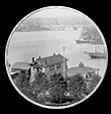|
SOCIETAL VIEWS ON PROSTITUTION IN VICTORIAN ENGLAND
cont.
Prostitutes in Victorian England served the purpose of
allowing men to project their negative feelings for women. As Kent comments
on the importance of prostitutes: "prostitutes were to Victorians
what witches were to mediaeval." With the implementation of the birth-control movement in the 1860s, men
no longer had to worry about impregnating prostitutes, hence making prostitution
more attractive.
With the implementation of the birth-control movement in the 1860s, men
no longer had to worry about impregnating prostitutes, hence making prostitution
more attractive. If there were no longer any repercussions of unwanted pregnancies, men
no longer had to worry with whom they engaged in sexual affairs. Since
it was inappropriate for the angel in the house to have sex except for
the purpose of procreating, men could turn to prostitutes or the "fallen"
woman to satisfy their sexual desires.
If there were no longer any repercussions of unwanted pregnancies, men
no longer had to worry with whom they engaged in sexual affairs. Since
it was inappropriate for the angel in the house to have sex except for
the purpose of procreating, men could turn to prostitutes or the "fallen"
woman to satisfy their sexual desires.
Pure women remained within the private sphere of home
and family, where sexual relations between men and women existed for love,
companionship, and procreation - all consistent with the ideology of a
woman as the 'angel in the house.' Victorians regarded the prostitute as the seducer of young men who personified
the societal 'diseases' of vanity, pleasure seeking activity, and greed.
Victorians regarded the prostitute as the seducer of young men who personified
the societal 'diseases' of vanity, pleasure seeking activity, and greed.
Victorians were known for their strict morals, which traditionally looked
down on anything or anyone that deviated from the social norm. However,
a new outlook began to surface among women towards their own position
in life. This led to new social organizations and strong female leaders,
some of whom are still admired today. The nineteenth-century feminist
Margaret Sanger was inspired and began to examine prostitution as the
consequence of an overly patriarchal society.
|





